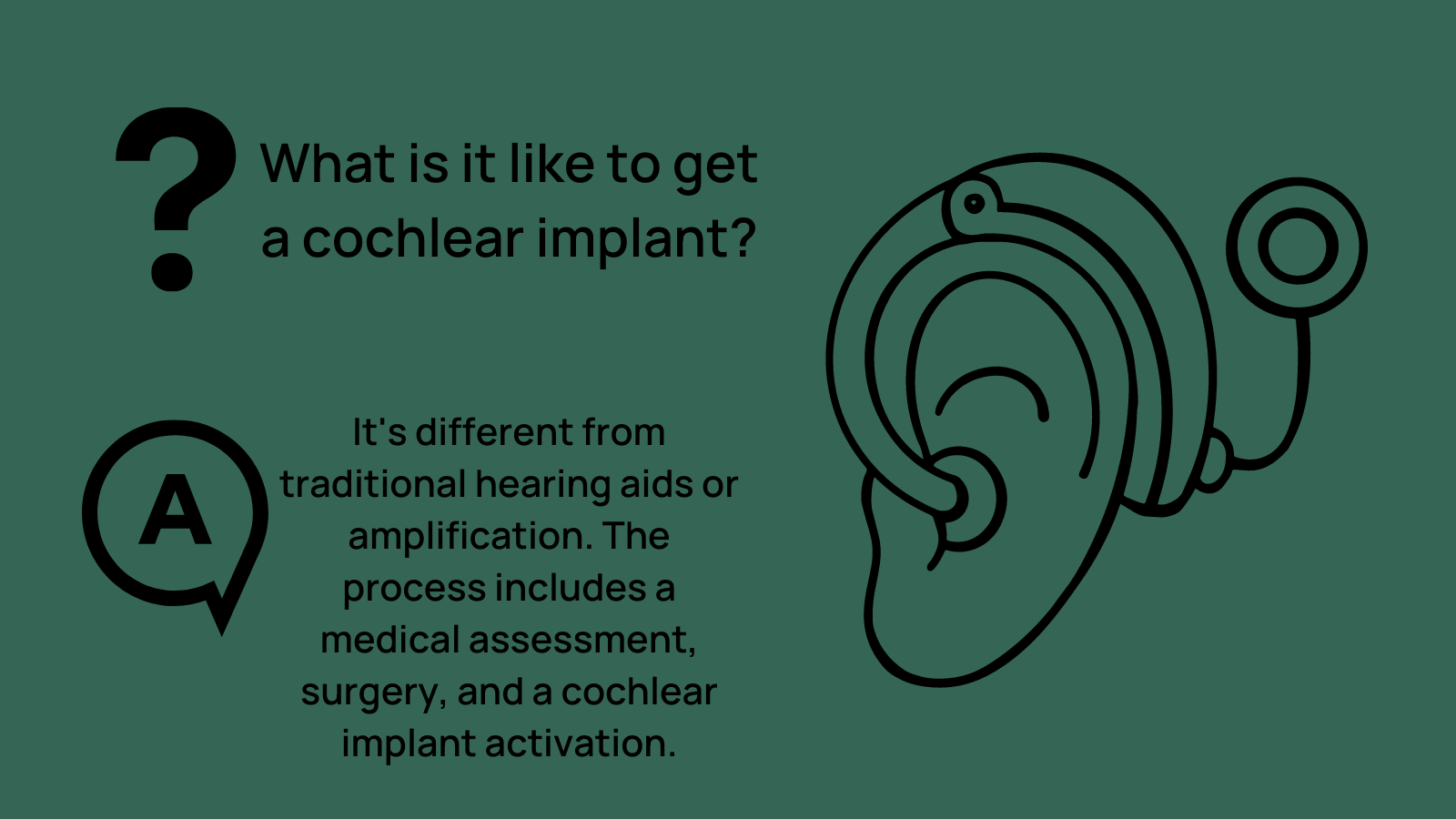Having a cochlear implant can be life-changing for someone with hearing loss. I've worked with many cochlear implant (or, CI) patients. While cochlear implants have many benefits for patients who no longer benefit from hearing aids, it is an individual choice and requires thoughtful consideration before making the leap. Cochlear implantation is not a quick fix. However, I've seen many patients experience improved quality of life after cochlear implantation. This article will go over the pros and cons of getting a cochlear implant, so you can make an informed decision about your hearing health.
What is a cochlear implant?
.png)
A cochlear implant is surgically placed under the skin behind the ear to stimulate the hearing nerve electrically in people with hearing loss. The device works by converting sound into electrical signals sent directly to the auditory nerve and on up to the brain, allowing an individual to hear previously imperceptible sounds with a damaged auditory system. A cochlear implant has two parts: The internal implant in the inner ear and the external processor, which stays in place with a magnet below the skin that holds it in place on the head.
What is it like to get a cochlear implant?

Getting a cochlear implant is very different from traditional hearing aids or amplification. The process will involve a medical assessment, surgery, and a cochlear implant activation.
Evaluation
Anyone considering a cochlear implant will start with a comprehensive evaluation that includes a medical assessment, hearing testing, speech testing while wearing hearing aids, and consultation regarding the device selection and rehabilitation process.
Procedure
After evaluation, the surgery is then scheduled. On the day of surgery, most patients go home the same day and need time to heal.
Rehabilitation
After about four weeks, the cochlear implant is activated, and the patient starts to perceive sound. When the cochlear implant is turned on for the first time, the sound will not be clear and may sound like noise. It takes time, patience, and consistent work with aural rehabilitation, such as listening practice.
Pros of Getting a Cochlear Implant
.png)
For those who no longer benefit from hearing aids, getting a cochlear implant restores hearing beyond what a hearing aid can provide. With time, cochlear implant patients can experience improved speech comprehension, better clarity and understanding of sounds, and increased ability to pick up on environmental noises like doorbells or phones ringing. As patients get used to the sound of their CI, voices become clearer, and hearing is possible again. While there is a range in performance outcomes, cochlear implant users often perceive improvement in these areas:
- Speech understanding
- Easier conversation with family and friends
- Environmental sound awareness
But, it is essential to note that the cochlear implant journey is an individual experience. For example, an adult with a longstanding history of severe hearing loss, a patient with Meniere's disease, or a patient with a sudden hearing loss will each have a unique journey and lived experience.
Cons of Getting a Cochlear Implant
.png)
Of course, reviewing the potential drawbacks of getting a cochlear implant is important. There are two areas to consider: Surgical and performance outcomes with a cochlear implant. Below, we'll talk about each one.
First, as with any major medical procedure, there's always the risk of complications during surgery or after recovery. While rare, surgical complications can include:
- Post-operative dizziness
- Changes in taste
- Risk of meningitis
- Infection at the surgical site
- Facial paralysis
Performance outcomes after surgery vary from patient to patient. The variable outcomes include:
- Speech understanding on the telephone
- Music appreciation
- Speech understanding in background noise
Some patients can understand speech on the telephone, while others find it difficult. The same applies to music appreciation—some CI patients appreciate music while others don't. With speech-in-noise understanding, outcomes are variable as well. Some patients are star performers in background noise, while others don't do as well.
How to Get Started
.png)
If you're interested in exploring whether or not a cochlear implant is right for you, there are several ways to find out more information. First, you can reach out to one of the cochlear implant manufacturers, and they can set you up with a patient who has been through the process. They will often connect you with a patient with similar background and interests, and I had patients tell me that this was a worthwhile experience and helped them make a decision.
Additionally, you can consult with a CI audiologist or neurotology clinic to ask questions and schedule an evaluation. They'll be able to answer any questions you have and provide guidance on the next steps. Want more info? Learn more in our guide to cochlear implants.
Conclusion
Getting a cochlear implant can be life-changing for someone with severe hearing loss—but it's essential to make the right decision for you. Before deciding if this option is right for you or your loved one, weighing the pros and cons carefully after consulting with your doctor or audiologist about safety concerns and other factors related to your situation is crucial. With the proper research and preparation, you can decide whether cochlear implants are right for you.






